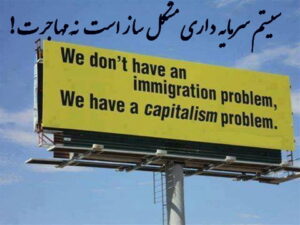Source; Ph. Buonarroti. La conspiration pour l’égalité, Editions Sociales, Paris. 1957;
Translated: for marxists.org by Mitchell Abidor;
CopyLeft: Creative Commons (Attribute & ShareAlike) marxists.org 2004.
In April 1796, hundreds of placards of the Analysis of the Doctrine of Babeuf were pasted up around Paris. Though not written by Babeuf, the text was officially sanctioned by the leaders of the Conspiracy. Its doctrine is heavily Rousseauist, and the form strangely resembles that of Spinoza’s Ethics, with the truth of the statements backed up by separate sections of proofs. There was a guerilla war around these posters, as the Equals would paste them up, and opponents would tear them down, only to see the Conspirators put them back up again.
Art 1
Nature gave every man an equal right to the full enjoyment of his goods.
Before they were first brought together, all men were equally the masters of the products which nature profusely spread around them.
- When men were brought together on uncultivated land, what could establish inequality among them? Is it their natural differences? They all have the same organs and the same needs. Is it the dependence of some on others? But no one was strong enough to enslave his like, when the smallest discontent could cause him to move elsewhere; and the advantages of mutual aid and benevolence made it necessary for all of them to respect in others the rights which they felt were invested in them by nature. Is it the ferocity of their hearts? But compassion is the immediate result of their organization, and ferocity is born of the frustration of the passions. Is it an innate tendency towards humiliation and servitude? But the mere sight of this is a painful sensation, a source of jealousy and hatred for even the most savage beings.
- If families are the first models of society, they are also the most striking proof of the rights of which we speak. Equality is a pledge of the tenderness of fathers, of the union and happiness of children. And if it’s broken? Sorrow and jealousy introduce disorder and violence. Everything concerning the love of parents, inspires in children the hatred of partiality, which parents themselves cannot apply without risking the introduction of dangerous passions into the family.
- The most strict equality had to be consecrated in the first agreements among men, for what could make men who had up to then been enemies of any form of distinction consent to privations and inferiority?
- The neglect of equality has introduced among men:
False ideas of happiness;
The straying of the passions;
The dwindling away of the species;
Violence, troubles, and wars;
The tyranny of some and the oppression of others;
Civic, political and religious institutions which, in consecrating injustice have finally dissolved societies, after having for a long time torn them apart.
The sight of distinctions, of the pomp and luxury that they don’t enjoy, was and will always be for the multitude an endless source of torment and worries. It is given to only a small number of wise men to avoid corruption, and once they’ve been separated from it, moderation is a good that the common folk no longer know how to appreciate.
What happens if some citizens create new needs, and they introduce into their pleasures refinements unknown to the multitude? Simplicity is then no longer loved, and happiness ceases to be found in an active life and a peaceful soul; distinctions and delight become the supreme good; no one is any longer satisfied with his state, and all seek in vain the happiness to which inequality has closed access to society.
The more distinctions one obtains, the more one wants, and the more jealousy and envy are excited; this is the source of so many extravagant enterprises; this is the source of the unquenchable and criminal thirst for gold and power; this is the source of hatred, violence and murder; this is the source of the bloody wars caused by a spirit of conquest and a jealousy of commerce, which don’t leave sorrowful humanity a single moment of rest.
In the midst of this overturning of ideas, weakness and sorrow destroy one portion of the species, enervates the other, and prepares for society generations incapable of defending it. From the attachment to distinctions is born the precautions we take to preserve them, despite the envy and the discontent they engender; these precautions take the form of barbaric laws, exclusionary forms of government, religious fables, servile morality: in a word, tyranny on one side, oppression on the other. Nevertheless, the voice of nature cannot be entirely stilled; it sometimes makes its ungrateful children blush; it avenges by its thunderous peal humanity’s tears, and if it rarely manages to reestablish itself in its rights, it always manages to disrupt those societies that ignore its laws.
If the equality of goods follows from that of our organs and our needs, if public and individual unhappiness, if the ruin of societies are the necessary effects of the blows which are struck against it, then this equality is a natural right.
Art. 2
The goal of society is to defend this equality, often attacked in the state of nature by the strong and the wicked, and to add to common happiness by the working together of all.
- We mean by society an association guided by agreed upon rules; and by state of nature accidental and imperfect society, in which men necessarily found themselves before submitting themselves to laws.
- Without examining here if attacks on liberty, such as those mentioned in this Article, can have taken place in the state of nature, it is obvious that if the inconveniences of that state determined men to establish laws, it was only those inconveniences that are born of the violation of equality. Whatever the case, the preservation of equality is the goal of association, because it’s only through it that men gathered together can be happy.
- In uniting their forces, mankind surely wanted to assure itself the maximum of pleasure with the minimum of pain.
The abundance of necessary things assures these pleasures, and is itself assured by the labor of those who are leagued together. This labor is reduced to the minimum for each of them only when it is shared by all.
Art. 3
Nature has imposed on everyone the obligation to work; no one can, without committing a crime, shirk labor.
- Labor is a precept of nature for all.
1st — Because a man isolated in the desert could not, without some form of labor, obtain subsistence.
2nd — because the activity occasioned by moderate labor is a source of health and recreation for man.
- This obligation could not be weakened by society, either for all as a group or each as an individual.
1st — Because its preservation depends on this
2nd — Because each one’s toils are the least possible only if all participate.
Art. 4
Labor and pleasures should be in common
That is to say that all must put up with an equal amount of work, and draw from it an equal amount of goods.
The justice of this principle flows from the proofs of Articles One to Three above. But what do we mean by community of labor? Do we want all citizens to be forced to do the same work? No; but we want all the different labors to be so shared that no able-bodied individual is idle. We want the increase in the number of workers to guarantee public abundance; we want it to be that in return each receive from the fatherland all he needs to meet his natural needs, as well as those artificial needs which all can satisfy.
An objection can be made: What would become of the productions of industry that are the fruit of time and industry? Is it not to be feared that, not being paid any more than other jobs, they vanish to the detriment of society? Sophism! It is to the love of glory, and not the love of riches that are owed for all time the efforts of genius. Millions of poor soldiers go to their deaths for the honor of serving the whims of a cruel master. How can we doubt of the powerful effect that happiness, love of equality and the fatherland, and the workings of a wise political system can have on the human heart? And would we have any need of the glitter of art, and the showiness of luxury, if we had the joy of living under the laws of equality?
Art. 5
Oppression exists when there is one who wears himself out at work and lacks everything, while another swims in abundance while doing nothing.
1 — Inequality and oppression are synonymous. If to oppress someone is to violate the law as it relates to him, those who are weighed down by inequality are oppressed, because inequality wounds natural law, to which it is absurd to oppose human laws.
2 — To oppress means: to restrict someone’s faculties, or to increase his burden. This is precisely what inequality does in diminishing the joys of he whose obligations it increases.
Art. 6
No one can, without committing a crime, exclusively expropriate the goods of the earth or of industry
If we can demonstrate that inequality has no other cause than this exclusive expropriation, we will have demonstrated the crime of those who introduce the distinction of mine and yours.
Private property was born the moment lands were parceled out. From that point everyone was absolute master of all he could take out of the fields that fell to him and the work he carried out.
It is probable that men working in the arts of primary necessity were at the same time excluded from any territorial possession, which they were in any case unable to exploit. Some were thus the masters of the things necessary for existence; others had a right to nothing but the salary the first group was willing to pay them. Nevertheless, this didn’t bring about any perceptible change, as long as the number of salaried employees didn’t exceed the number of landowners. But as soon as natural events, the thrift, or the skill of some; the wastefulness or the handicaps of the others, and territorial property having been brought together in the hands of a few families, those receiving salaries became more numerous than those paying salaries, and the former were at the mercy of the latter who, proud of their opulence, reduced the others to a frugal lifestyle.
It is from this revolution that the sinister effects of inequality outlined in Art 1 date. Since then, we have seen the idler, by a revolting injustice, live by the sweat of the working man, overwhelmed under the weight of fatigues and privations; we have seen the rich as if they were master take control of the state and dictate tyrannical laws to the poor brutalized by need, degraded by ignorance and fooled by religion.
Unhappiness and slavery flow from inequality, and the latter from property. Property is thus the greatest of society’s plagues. It is a veritable public offence.
It will be said that property existed prior to society, and that society was formed to defend it. But how could we have had even the idea of such a right, as long as contracts didn’t assure to the owner the fruits of his labor? How can society owe its origin to that institution the most subversive of social feeling?
Let no one tell us that it’s only fair that the hard-working and thrifty should be paid to live in opulence and the idler punished by misery. It is doubtless only fair that the active man, in paying off his debt, receive from the fatherland what it can give him without ruining itself; it’s only fair that he be repaid in public recognition. But he can’t, for all that, acquire the right to poison his country, no more than a soldier by his valor acquires that to enslave.
There are certainly some evil subjects who have only their own vices to blame for the misery to which they’re reduced , but it’s not likely that all of the poor can be put in that class. A large mass of field and factory workers live on bread and water, in order that the vile libertine enjoy in peace the inheritance of an inhuman father, and so that a millionaire manufacturer can send cheap fabrics and jewels to other countries, that in turn supply our lazy sybarites Arabian perfumes and exotic birds. These evil subjects, would they be so without the vices and follies to which they are dragged by the social institutions which punish them for the effects of the passions whose development it provokes?
Art 7
In a real society there should be neither rich nor poor.
Art 8
The rich who don’t renounce their excess in favor of the indigent are the enemies of the people.
Art 9
No one can, through the accumulation off all means available, deprive another of the instruction necessary for his happiness. Instruction must be for all.
- This accumulation blocks working people from even the possibility of acquiring the knowledge necessary for every citizen.
- Even if the people don’t require a broad education, they need some education in order not to be the prey of tricksters and so-called experts. It must know its rights and its obligations.
Art. 10
The goal of the revolution is to destroy inequality and restore common happiness
Who is the honest man who would want to deliver his fellow citizens to the convulsions and evils of a political revolution which would have as its goal to render them more unhappy still, or to put them in a state from which would flow their total ruin? To skillfully seize the moment for reform is not the least of tasks for a clever and virtuous politics.
Art. 11
The constitution of 1793 is the true constitution of the French, for the people solemnly accepted it; because the Convention did not have the right to change it; because in order to arrive at this, they shot down the people who demanded its fulfillment; because it chased and killed those deputies who did their duty in defending it; because terror against the people and the influence of emigrants presided over the writing and the acceptance of the constitution of 1795, which didn’t even receive a quarter of the votes of that of 1793; because the constitution of 1793 consecrated the inalienable rights of each citizen to consent to laws, to exercise political rights, to assemble, to demand that which it considers useful, to be educated and not die of hunger; rights which the counter-revolutionary act of 1795 openly and completely violated.
Art 13
Every citizen is obligated to re-establish and defend in the constitution of 1793 the will and the happiness of the people.
Art. 14
All powers emanating from the so-called constitution of 1795 are illegal and counter-revolutionary.
Art 15
Those who raised their hand to the constitution of 1793 are guilty of the crime of lese majesté against the people.
Gracchus Babeuf and the Conspiracy of the Equals
آدرس و اسامی صفحات مرتبط با فدراسیون عصر آنارشیسم
Federation of Anarchism Era Social Media Pages
۱- آدرس تماس با ما
asranarshism@protonmail.com
info@asranarshism.com
۲- عصر آنارشیسم در اینستاگرام
۳- عصر آنارشیسم در تلگرام
۴- عصر آنارشیسم در توئیتر
۵ – فیسبوک عصر آنارشیسم
۶ – فیسبوک بلوک سیاه ایران
۷ – فیسبوک آنارشیستهای همراه روژاوا و باکور - Anarchists in solidarity with the Rojava
۸ – فیسبوک دفاع از زندانیان و اعدامیان غیر سیاسی
۹ – فیسبوک کارگران آنارشیست ایران
۱۰- فیسبوک کتابخانه آنارشیستی
۱۱ – فیسبوک آنارشیستهای همراه بلوچستان
۱۲ – فیسبوک هنرمندان آنارشیست
۱۳ – فیسبوک دانشجویان آنارشیست
۱۴ – فیسبوک شاهین شهر پلیتیک
۱۵ – فیسبوک آنتی فاشیست
۱۶- تلگرام آنارشیستهای اصفهان و شاهین شهر
۱۷ – اینستاگرام آنارشیستهای اصفهان و شاهین شهر
۱۸- تلگرام آنارشیستهای شیراز
۱۹ – تلگرام ” جوانان آنارشیست ”
۲۰ - تلگرام آنارشیستهای تهران
۲۱ – اینستاگرام جوانان آنارشیست
۲۲ – گروه تلگرام اتحادیه آنارشیستهای افغانستان و ایران
۲۳ – توییتر اتحادیه آنارشیستهای افغانستان و ایران - The Anarchists Union of Afghanistan and Iran
۲۴ – فیسبوک اتحادیه آنارشیستهای افغانستان و ایران
۲۵ – اینستاگرام اتحادیه آنارشیستهای افغانستان و ایران
۲۶ – کانال تلگرام خودسازماندهی مطالب گروه اتحاديه آنارشیستهای افغانستان و ايران
۲۷ – گروه تلگرام خودساماندهی مطالب گروه اتحادیه آنارشیستهای افغانستان و ایران
۲۸– اینستاگرام آنارشیستهای بوکان - ئانارکیستە کانی بۆکان
۲۹- کانال تلگرام کتابخانه شورشی
۳۰- کانال تلگرام ریتم آنارشی
۳۱- تلگرام آنارشیستهای اراک
۳۲- تلگرام قیام مردمی
۳۳- ماستودون عصرآنارشیسم
۳۴- فیسبوک آنارشیستهای مزار شریف
۳۵- فیسبوک آنارشیستهای کابل









